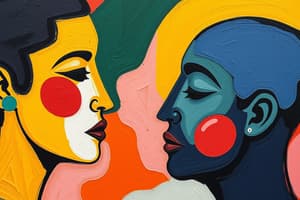Podcast
Questions and Answers
What is the primary factor that influences how individuals learn to play social roles?
What is the primary factor that influences how individuals learn to play social roles?
- Peer pressure
- Societal expectations (correct)
- Cultural stereotypes
- Personal preferences
Which term describes the everyday customs that govern social behavior?
Which term describes the everyday customs that govern social behavior?
- Taboos
- Norms
- Mores
- Folkways (correct)
What is enculturation primarily concerned with?
What is enculturation primarily concerned with?
- Discovering personal preferences and desires
- Understanding the roles you play in society
- Adopting the culture you are born into (correct)
- Learning societal expectations and norms
Which statement accurately describes socialization?
Which statement accurately describes socialization?
Role conflict occurs when an individual faces challenges balancing multiple roles. Which of the following is an example?
Role conflict occurs when an individual faces challenges balancing multiple roles. Which of the following is an example?
What does the term 'deviance' refer to in the context of social behavior?
What does the term 'deviance' refer to in the context of social behavior?
How does identity formation occur according to the concepts discussed?
How does identity formation occur according to the concepts discussed?
What does social identity refer to?
What does social identity refer to?
Which of the following best defines 'taboos' in a cultural context?
Which of the following best defines 'taboos' in a cultural context?
How is identity primarily formed according to the discussed theories?
How is identity primarily formed according to the discussed theories?
What does 'existential I' represent in the context of human identity?
What does 'existential I' represent in the context of human identity?
Which of the following is NOT a component of identity formation?
Which of the following is NOT a component of identity formation?
What is the role of social control in society?
What is the role of social control in society?
Which process helps you understand societal expectations?
Which process helps you understand societal expectations?
Which best describes 'mores' in societal rules?
Which best describes 'mores' in societal rules?
What is the impact of being isolated during childhood on identity development?
What is the impact of being isolated during childhood on identity development?
What term describes the process of differentiating oneself by choosing a path contrary to familial expectations?
What term describes the process of differentiating oneself by choosing a path contrary to familial expectations?
Which aspect of identity is influenced by a person's interactions with others and roles they assume?
Which aspect of identity is influenced by a person's interactions with others and roles they assume?
What would best exemplify the cultural values present in Scandinavian countries?
What would best exemplify the cultural values present in Scandinavian countries?
What concept describes the idea that one's identity can change based on the roles they are performing in various social contexts?
What concept describes the idea that one's identity can change based on the roles they are performing in various social contexts?
Which identity theory suggests that children's identities are shaped by societal roles expected of them?
Which identity theory suggests that children's identities are shaped by societal roles expected of them?
In the context of personal identity, how might unique experiences influence a person's self-perception?
In the context of personal identity, how might unique experiences influence a person's self-perception?
What is an example of a folkway in Asian cultures?
What is an example of a folkway in Asian cultures?
Which statement best captures the essence of symbolic interactionism in identity formation?
Which statement best captures the essence of symbolic interactionism in identity formation?
What is a serious violation of trust often exemplified by dishonesty in many societies?
What is a serious violation of trust often exemplified by dishonesty in many societies?
Which of the following best represents a strict social taboo?
Which of the following best represents a strict social taboo?
Which example best illustrates role strain?
Which example best illustrates role strain?
What situation exemplifies formal sanctions in social control?
What situation exemplifies formal sanctions in social control?
What is the primary outcome for someone labeled as 'deviant' in society?
What is the primary outcome for someone labeled as 'deviant' in society?
Which example demonstrates the concept of conformity?
Which example demonstrates the concept of conformity?
Which of the following is an example of role exit?
Which of the following is an example of role exit?
What serves as a positive sanction in a school environment?
What serves as a positive sanction in a school environment?
Study Notes
Enculturation and Socialization
- Enculturation: The process of learning the culture one is born into, including language, customs, beliefs, and values from family and community.
- Example of Enculturation: A child in India learns to eat with hands as part of cultural dining practices.
- Socialization: Society's method of teaching individuals expected behaviors, like politeness and respect for elders.
- Example of Socialization: A teenager in the U.S. is taught to use "please" and "thank you" as part of polite manners enforced by parents and society.
- Feral Child Case Study: Genie, isolated during early childhood, lacked exposure to social norms, struggling to adjust due to insufficient socialization and enculturation.
Identity Formation
- Identity is shaped by both enculturation and socialization.
- Individuation: The process of discovering one's unique identity despite societal influences.
- Personal Identity: Your individual sense of self, influenced by experiences and self-perception within society.
- Social Identity: How individuals perceive themselves in relation to group memberships, like student or friend.
- Distinction between personal and social identities allows for both uniqueness and group affiliation.
Four Parts of Human Identity
- Existential "I": Core self, representing one's deep sense of identity and values.
- Doing "Me": Daily actions and behaviors reflecting one's identity.
- Cultural "I": Identity shaped by cultural factors and societal norms.
- Performing "Me": Adaptation of identity based on different societal roles or situations.
Theories of Identity
- Role Learning Theory: Individuals learn to perform roles based on societal expectations, such as being a "good student" or "responsible adult."
- Symbolic Interactionism: Identity formation occurs through interactions with others, shaping how individuals perceive themselves based on feedback from their environment.
Norms and Values
- Cultural Values: Beliefs about what is considered good or right—e.g., independence or family.
- Norms: Expected behaviors, such as polite greetings.
- Folkways: Casual everyday customs, like greetings or dress norms.
- Mores: Moral rules that ensure societal ethics.
- Taboos: Extremely prohibited behaviors, often with social or legal consequences, like incest.
- Laws: Formal rules established by governments, with penalties for violation.
Status and Roles
- Status: One’s position in society, such as being a student.
- Role: Expected behaviors associated with a status, like attending classes.
- Role Conflict: Difficulty balancing multiple roles, such as being both a student and employee.
- Role Strain: Challenges in fulfilling responsibilities of one role, like managing schoolwork alongside extracurricular activities.
- Role Exit: The process of leaving a social role, such as quitting a job or dropping a class.
Conformity and Deviance
- Conformity: Adherence to societal rules, such as following dress codes.
- Deviance: Actions that go against social norms, like skipping class.
- Stigma: Negative labels attached to deviant behavior, impacting an individual's social standing.
- Social Control: Mechanisms used by society to maintain order, including rewards for conformity and punishments for deviance.
Conclusion
- Identity is not inherent but formed through enculturation and socialization processes.
- Traditional influences like family remain significant, while social media increasingly shapes individual identity expression.
Studying That Suits You
Use AI to generate personalized quizzes and flashcards to suit your learning preferences.
Related Documents
Description
This quiz explores the concepts of enculturation, socialization, and identity formation. Learn how cultural norms and societal expectations shape individual behaviors and values. Dive into examples of how these processes impact personal development and community engagement.



